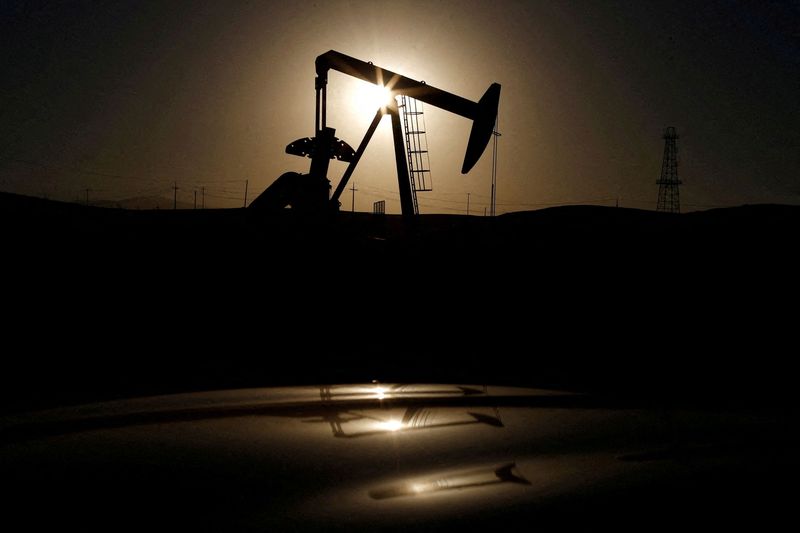By Scott DiSavino
NEW YORK (Reuters) - Oil prices steadied near $110 a barrel on Thursday as a stronger dollar and a drop in global stock markets offset supply concerns after the European Union laid out plans for new sanctions against Russia including an embargo on crude in six months.
Global benchmark Brent futures fell 41 cents, or 0.4%, to $109.73 a barrel by 11:54 a.m. EDT (1554 GMT), while U.S. West Texas Intermediate (WTI) crude fell 76 cents, or 0.7%, to $107.05.
The U.S. dollar rebounded on Thursday but held below 20-year highs reached last week, a day after the Federal Reserve affirmed that it would take aggressive steps to combat inflation but played down the prospect of even larger rate hikes.
A strong dollar makes oil more expensive for holders of other currencies.
The Nasdaq plunged 4.6% and the other major indexes tumbled on Thursday after Fed Chair Jerome Powell's less hawkish tone failed to ease investor expectations of bigger interest rate hikes this year.
The EU sanctions proposal, which needs unanimous backing from the 27 countries in the bloc, includes phasing out imports of Russian refined products by the end of 2022 and a ban on all shipping and insurance services for transporting Russian oil.
"The oil market has not fully priced in the potential of an EU oil embargo, so higher crude prices are to be expected in the summer months if it's voted into law," Rystad Energy head of oil markets research Bjornar Tonhaugen said.
French Environment and Energy Minister Barbara Pompili expressed confidence that EU members would reach a consensus on sanctions by the end of this week.
"The planned EU oil embargo represents a massive logistical challenge for oil markets," Investec's head of commodities, Callum Macpherson said. "Rerouting Russian output from Europe to willing buyers in Asia, in the presence of sanctions, is already so challenging that even Russia has admitted its production will decline significantly."
Japan said it would face difficulties in immediately cutting off Russian oil imports over the invasion of Ukraine.
OPEC+, which comprises the Organization of the Petroleum Exporting Countries, Russia and their allies, agreed to another modest monthly oil output increase, arguing that the producer group could not be blamed for disruptions to Russian supply.
Ignoring calls from Western nations for accelerating output hikes, the group agreed to raise June production by 432,000 barrels per day, in line with an existing plan to unwind curbs made in 2020 when the COVID-19 pandemic hammered demand.
A U.S. Senate committee passed a bill that could expose OPEC+ to lawsuits for collusion on boosting oil prices. Versions of the legislation have failed in Congress for more than two decades, but lawmakers are increasingly worried about rising inflation driven in part by high gasoline prices.

Surging oil prices have lessened the pressure on energy-reliant Iran to revive a 2015 nuclear pact with world powers, which would ease sanctions and add more crude to world markets, three officials familiar with Tehran's thinking said.
The United States, meanwhile, said it will take bids this autumn to buy back 60 million barrels of crude oil for its Strategic Petroleum Reserve, the first step in replenishing the stockpile after a record-sized release this spring to help tame runaway energy prices.